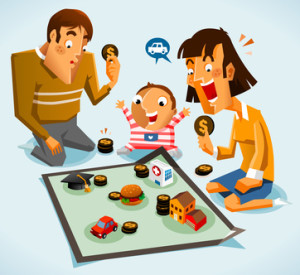 Click the link if you’d rather listen than read!
Click the link if you’d rather listen than read!
Okay, we blew it.
Here the universe gave us a perfectly good opportunity to change how we lived and to get real about our finances. It was called “The Economic Crisis of 2008.”
You remember, don’t you? Lots of people lost their homes. Some because they lost one or both incomes in the family. Others because they had been keeping up with the Joneses and owned too much house. (Remember McMansions being built where perfectly fine houses had stood before?) Then, as soon as the economy went wonky, they found themselves upside down with their mortgages, so there was no longer any equity in the house to borrow against.
Once credit card companies started tightening the size of credit lines, people who were living off their cards were caught short. How were they to keep up their lifestyles without their cards? How were they supposed to make their minimum payments if they had no available credit on any other card to pay them with?
Oops, reality check. Time to learn to live on less.
A Taboo is Broken
Then we had another opportunity: because everyone was in the same financial mess, people actually started talking about their finances a bit. “Bankruptcy” and “foreclosure”—two words that would not have crossed people’s lips two years before—became topics of conversation even in polite company.
Those of us who work with people who are trying to get their finances under control figured this was the silver lining in the worldwide grey cloud.
But it didn’t last. Soon the elephant was back in the room and the dialog about money ended. After all, you can’t be honest about your money if you’re not being honest with yourself.
A Lost Opportunity
Millions are permanently displaced from the pool of “Joneses wannabes” because they’ve never replaced their lost incomes and have been downsized into invisibility. But those who caught themselves and somehow got a toehold are back to the same games.
Instead of having learned permanently how to live on less, they’re lying to themselves and trying to keep up with the Joneses again:
- They’re pretending they can afford to take on more credit card debt.
- They’re pretending they can afford the big house they’ve somehow managed to hang on to … or the even larger one because now interest rates are (artificially) so low.
- They’re pretending they can afford new furniture for the house because they can buy it “zero down, no payments for 36 months.”
- They’re pretending they can afford new cars because lease payments of a mere $199 or $299 per month seem reasonable, compared to what they pay monthly for their cell phones and cable television. (A car isn’t seen as an asset anymore, it’s a service.)
There’s only one detail: the Joneses are broke. Besides, the Joneses never were particularly happy. They were always way too stressed to be happy.
How to Be Rich and Happy
The “rich” can be defined in two ways: (1) they are the people who have acquired and kept enough money to no longer have to worry about it, or (2) they are the people who have adjusted their lifestyle so it is no longer a strain on the resources they do have.
In either case, these two groups differ from the “fakers” in two very simple (but very powerful) ways:
- They talk about their money easily and honestly.
- They live within (or below) their means.
Killing the Joneses
So what would you be willing to do if you were living with the emotional, mental, physical and even spiritual stress of pretending you could afford your lifestyle when you really couldn’t?
Would you be willing to be honest and vulnerable with those you love about what is really going on with your money?
Would you be willing to ignore the media’s well-crafted tale that if you’ll just spend all your hard-earned money on the niceties of life, you’ll be happy?
Would you be willing to get real about what you can and can’t afford, so that with time you can get out from under the pressure of crushing debt?
Unless you’re already among the “rich,” whichever definition you use, as I see it you have two choices: (1) you can continue to pretend all is well and chase the artificial lifestyle of the Joneses, or (2) you can get honest with yourself, shed the pretenses and move quickly to where money is a tool that brings you freedom and peace of mind.
Which will it be?
Let us know in the Comments section below if the Economic Crisis of 2008 taught you any lessons that are still with you today.
xxxxxxxxxx
 Bio: Sharon O’Day fixes financial lives. She is a tell-it-like-it-is money expert with a successful career in global finance, plus an MBA from the Wharton School. Today she specializes in getting entrepreneurial women over 50 back on their game so they can have more money, less stress and more joy. With her “Over Fifty and Financially Free” strategies, they take actions that lead to their ultimate goal: financial peace of mind.
Bio: Sharon O’Day fixes financial lives. She is a tell-it-like-it-is money expert with a successful career in global finance, plus an MBA from the Wharton School. Today she specializes in getting entrepreneurial women over 50 back on their game so they can have more money, less stress and more joy. With her “Over Fifty and Financially Free” strategies, they take actions that lead to their ultimate goal: financial peace of mind.






